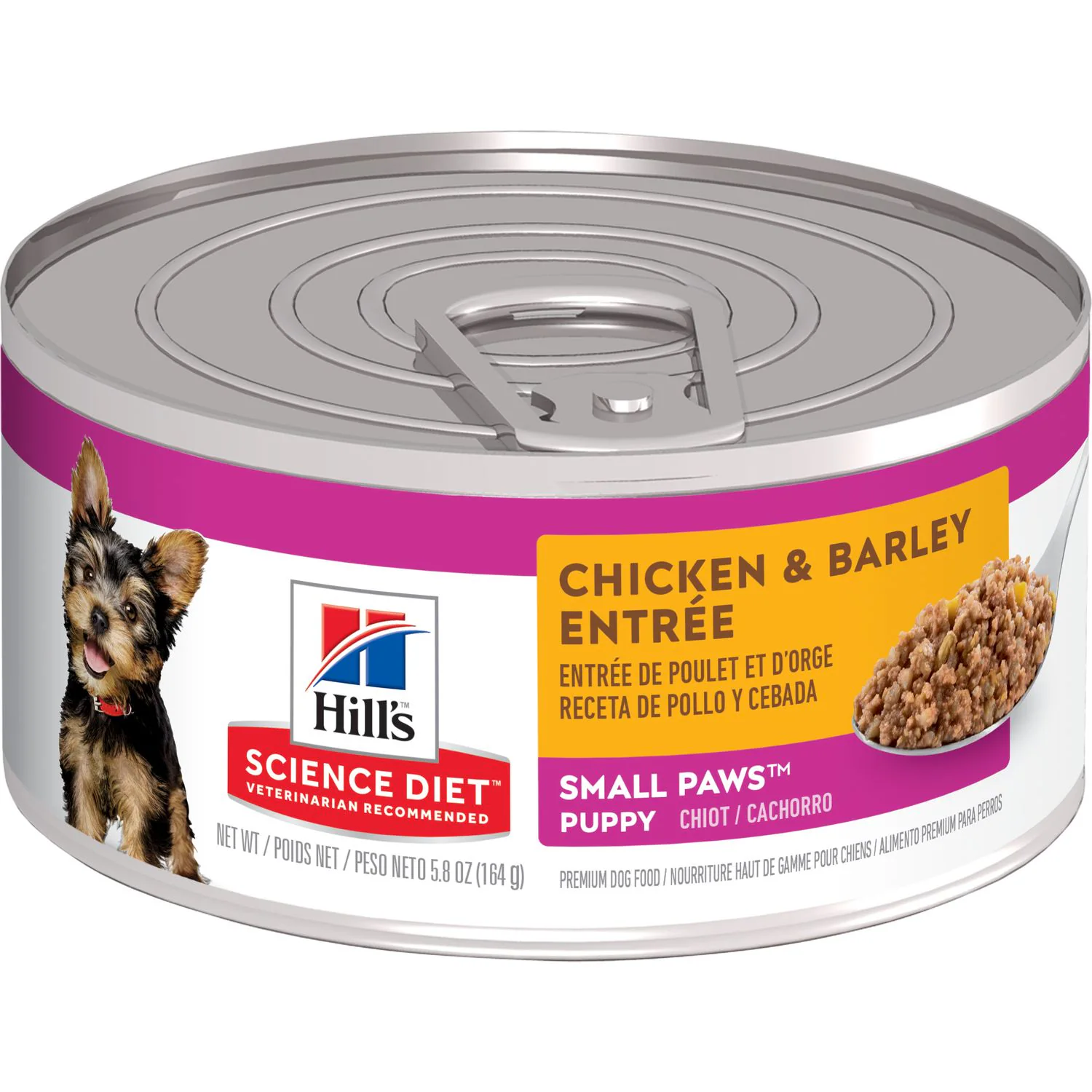
DogFoodAdvisor is reader supported See how
All reviews are 100% impartial but if you buy using links on this page, we may earn a referral fee.
Our Verdict
Hill’s Science Diet Puppy canned product range is made up of six recipes with ratings varying from 2.5 to 3.5 stars. The average rating of the whole range is 3 stars.
The table below shows each recipe in this range including our rating and the AAFCO nutrient profile: Growth (puppy), Maintenance (adult), All Life Stages, Supplemental or Unspecified.
| Product line | Rating | AAFCO |
|---|---|---|
| Hill's Science Diet Puppy Chicken and Barley Entrée | 3 | G |
| Hill's Science Diet Puppy Small and Mini Beef and Barley Entrée | 3 | G |
| Hill's Science Diet Puppy Small and Mini Savory Stew with Chicken and Vegetables | 2.5 | G |
| Hill's Science Diet Puppy Small Paws Chicken and Barley Entrée | 3.5 | G |
| Hill's Science Diet Puppy Sensitive Stomach & Skin Salmon & Vegetable Stew | 3 | G |
| Hill's Science Diet Puppy Savory Stew with Chicken & Vegetables | 2.5 | G |
Recipe and Label Analysis
Hill’s Science Diet Puppy Small Paws Chicken and Barley Entree was selected to represent the other products in the line for detailed recipe and nutrient analysis.
Hill's Science Diet Small Paws Puppy Chicken and Barley Entree
Estimated Dry Matter Nutrient Content
Protein
Fat
CarbsCarbohydrates
Water, chicken, whole grain corn, cracked pearled barley, soybean meal, pork liver, dicalcium phosphate, fish oil, iodized salt, potassium chloride, vitamins (vitamin E supplement, ascorbic acid (source of vitamin C), thiamine mononitrate, niacin supplement, calcium pantothenate, vitamin B12 supplement, pyridoxine hydrochloride, biotin, vitamin D3 supplement, riboflavin supplement, folic acid), choline chloride, minerals (zinc oxide, ferrous sulfate, manganese sulfate, copper sulfate, calcium iodate), taurine, beta-carotene
Fiber (estimated dry matter content) = 1.5%
Red denotes any controversial items
| Estimated Nutrient Content | |||
|---|---|---|---|
| Method | Protein | Fat | Carbs |
| Guaranteed Analysis | 7% | 4% | NA |
| Dry Matter Basis | 32% | 18% | 42% |
| Calorie Weighted Basis | 27% | 38% | 36% |
Ingredients Analysis
The first ingredient in this dog food is water, which adds nothing but moisture to this food. Water is a routine finding in most canned dog foods.
The second ingredient is chicken. Chicken is considered “the clean combination of flesh and skin… derived from the parts or whole carcasses of chicken”.1
Chicken is naturally rich in the ten essential amino acids required by a dog to sustain life.
The third item is corn. Corn is an inexpensive and controversial cereal grain. And aside from its energy content, this grain is of only modest nutritional value to a dog.
The next ingredient is barley, which is a starchy carbohydrate supplying fiber and other healthy nutrients. However, aside from its energy content, this cereal grain is of only modest nutritional value to a dog.
The fifth ingredient is soybean meal, a by-product of soybean oil production more commonly found in farm animal feeds.
Although soybean meal contains 48% protein, this ingredient would be expected to have a lower biological value than meat.
And less costly plant-based products like this can notably boost the total protein reported on the label – a factor that must be considered when judging the actual meat content of this dog food.
The sixth ingredient is pork liver. This is an organ meat sourced from a named animal and thus considered a beneficial component.
The next ingredient is dicalcium phosphate, likely used here as a dietary calcium supplement.
The eighth ingredient is fish oil. Fish oil is naturally rich in the prized EPA and DHA type of omega-3 fatty acids. These two high quality fats boast the highest bio-availability to dogs and humans.
Depending on its level of freshness and purity, fish oil should be considered a commendable addition.
From here, the list goes on to include a number of other items.
But to be realistic, ingredients located this far down the list (other than nutritional supplements) are not likely to affect the overall rating of this Hill’s product.
With two notable exceptions…
First, we note the use of taurine, an important amino acid associated with the healthy function of heart muscle. Although taurine is not typically considered essential in canines, some dogs have been shown to be deficient in this critical nutrient.
And lastly, the minerals listed here do not appear to be chelated. And that can make them more difficult to absorb. Chelated minerals are usually associated with higher quality dog foods.
Nutrient Analysis
Based on its ingredients alone, Hill’s Science Diet Puppy Small Paws Chicken and Barley Entree looks like an average wet product.
The dashboard displays a dry matter protein reading of 31.8%, a fat level of 18.2% and estimated carbohydrates of about 42%.
As a group, the brand features an average protein content of 31.5% and a mean fat level of 18.9%. Together, these figures suggest a carbohydrate content of 41.6% for the overall product line.
And a fat-to-protein ratio of about 60%.
Which means this Science Diet product line contains…
Below-average protein. Below-average fat. And above-average carbs when compared to other wet dog foods.
When you consider the protein-boosting effect of the soybean meal, this looks like the profile of a wet dog food containing a moderate amount of meat.
Hill's Dog Food Recall History
The following automated list (if present) includes all dog food recalls related to Hill's through November 2024.
No recalls noted.
You can view a complete list of all dog food recalls since 2009 here.
Our Rating of Hill's Science Diet Puppy Grain-Inclusive Dog Food
Hill’s Science Diet Puppy is a grain-inclusive moisture-rich dog food using a moderate amount of named meats as its dominant source of animal protein, thus earning the brand 3 stars.
Compare Hill's Science Diet Puppy Dog Food
How does Hill's Science Diet Puppy compare with The Dog Food Advisor's most recommended brands?
A Final Word
The Dog Food Advisor does not accept money, gifts, samples or other incentives in exchange for special consideration in preparing our reviews.
However, we do receive a referral fee from online retailers (like Chewy or Amazon) and from sellers of perishable pet food when readers click over to their websites from ours. This helps cover the cost of operation of our free blog. Thanks for your support.
For more information, please visit our Disclaimer and Disclosure page.








